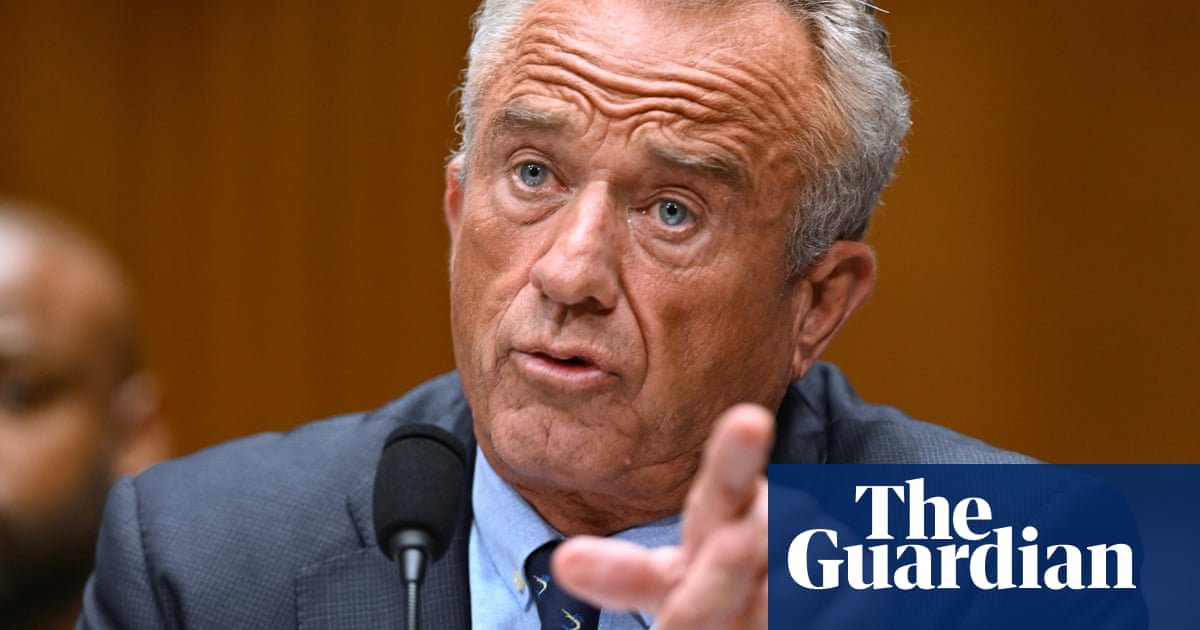Health secretaryRobert F Kennedy Jrrefused to say whether he would vaccinate his children if he had to choose today, and defended Republicans’ proposal to cut healthcare to fund tax cut extensions.
Kennedy’s back-to-back testimony before House and Senate committees were his first appearances before lawmakerssince his confirmationin February. The secretary was called to discuss Donald Trump’s proposed budget, which would impose disproportionatelylarge cutsto scientific enterprises at the health department.
However, the most memorable exchange went to a deeper tension between Kennedy and his own department – his contradictory and at timesinflammatory statementson vaccines.
“If you had a child today, would you vaccinate that child for measles?”beganDemocratic congressman Mark Pocan of Wisconsin at the House appropriations committee hearing.
“For measles? Um, probably for measles,” said Kennedy, in one of the few hesitations of the hearing. “What I would say is my opinions about vaccines are irrelevant … I don’t want to seem like I’m being evasive, but I don’t think people should be taking advice, medical advice, from me.”
Vaccines are considered one of public health’sgreatest victories, and the measles vaccine is alone is estimated to have saved90 million livesin five decades. The US is in the midst of the single worst measles outbreaksince 2000. Three people, includingtwo unvaccinated children, have died in Texas. Prior to heading the health department, Kennedy led arguably the mostinfluential anti-vaccine campaigngroup in the nation.
Pocan went on to ask about chickenpox.
“Um, again, I don’t want to give advice,” Kennedy said, before commenting on shingles.
Pocan continued: “Polio?”
“Polio?” Kennedy said. “Again, I don’t want to be giving advice.”
The issued re-emerged in his afternoon testimony before the Senate committee on health, education, labor and pensions, where Democrat Chris Murphy asked Kennedy if he would recommend the measles vaccine. The secretary demurred, prompting Murphy to say: “I think that’s really dangerous for the American public and for families.”
“The secretary of health and human services is no longer recommending the measles vaccines,” Murphy said.
Kennedy’s hearing came at an exceptionally tumultuous period in America’s public health history. With help from billionaire Elon Musk’s unofficial “department of government efficiency”, Kennedy has eliminatedroughly 20,000 jobs, whole departments andexpert public health labs. He has also effectively cut the federal biomedical and behavioral research budgetby $2.7bn– including cancer research alone by 31% year-over-year – byfailing to distributeor “impounding” funds.
Officially, the hearing was intended to investigate a White House budget proposal to cut tens of billions from the health department – slashing the federal government’s biomedical research arms in particular, theNational Institutes of Health (NIH), by 40%.
However, it also took bizarre turns – as when Kennedy asserted that agencies would soon be “phasing out most animal studies” in favor of using artificial intelligence. Organic chemist and drug discovery researcher Derek Lowe described Kennedy’s claim as “bullshit”. He said such advances, while promising, were “years” away.
The White House budget has come alongside Republicans formally unveiling a “big, beautiful bill” toextend tax cutsfrom President Trump’s first term by effectively cutting federal healthcare subsidies. The Congressional Budget Officeestimatesthat an additional 13.7 million Americans could become uninsured if the proposal moves forward.
The bill proposes adding work requirements to Medicaid and ending a federal subsidy for individual insurance through the Affordable Care Act (ACA), better known as “Obamacare”. Medicaid covers about 71 million low-income, disabled and elderly Americans – making it the largest health insurance program in the nation. This is Trump’s first attempt to restrict healthcaresince 2017, when an attempt to repeal the ACA was dramatically tanked from within his own party.
Some Republicans are already wary of the bill, warning that taking away healthcare was, in Missouri Republican senator Josh Hawley’s words, “morally wrong and politically suicidal”. Advocacy groups have also rallied to oppose the cuts.
“These work requirements and reporting requirements are designed to kick people off Medicaid,” said Julie Nickson, director of federal relations at the American Cancer Society Cancer Action Network. “And that’s what they’ll do.”
Even as Kennedy has eviscerated departments and laid off workers, the health department has released few official details of the “reorganization” other than to claim that it would eliminate “fraud, waste and abuse”. Kennedy continued that pattern on Wednesday, as he told lawmakers he could not answer detailed questions about changes he has imposed.
“I’m going to talk very, very broadly … We are under a court order yesterday afternoon not to do any more planning under the reorganization, and I have been advised by my attorneys not to talk about it,” Kennedy said.
Global health law professor Lawrence Gostin of Georgetown Law School called Kennedy’s assertions that the court order barred him from answering questions “pure nonsense”.
“The Department of Justice may be advising the secretary not to discuss the litigation,” said Gostin. “But the secretary has a public duty to explain the reasoning behind the reorganization of his department and to show why it is in the public interest.”
In addition to enormous and often untold cuts, Kennedy has also reinstated departments – Democrats argued based on political favor. For the first time, Kennedy commented on reinstatement of two branches of the National Institute for Occupational Health and Safety (Niosh) and the World Trade Center Health Program.
The programs researched and monitored miners for pneumoconiosis, better known as black lung, ran the firefighters’ national cancer registry and, paid for the healthcare of victims of the September 11 attacks.
“I reinstated 328 employees at Niosh – about a little over a third of them were in Morgantown and a third in Cincinnati and the WTC group,” Kennedy told Republican Riley Moore about programs in West Virginia and Ohio respectively.
Connecticut Democrat Rosa DeLauro said: “I don’t understand why Republicans get to call you to spare offices like Niosh … Is there a special phone number if I want to save tobacco prevention, lead poisoning?”
Chris Stein contributed reporting
